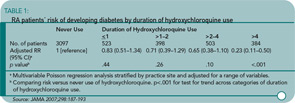HYDROXYCHLOROQUINE
Hydroxychloroquine: The Unsteroid?
By Daniel Hal Solomon, MD, MPH Wasko MC, Hubert HB, Lingala VB, et al. Hydroxychloroquine and risk of diabetes in patients with rheumatoid arthritis. JAMA. 2007;298:187-193.
Abstract
Context: Hydroxychloroquine (HCQ), a commonly used anti-rheumatic medication, has hypoglycemic effects and may reduce the risk of diabetes mellitus.
Objective: To determine the association between HCQ use and the incidence of self-reported diabetes in a cohort of patients with RA.
Design, setting, and patients: A prospective, multicenter, observational study of 4,905 adults with RA (1,808 had taken HCQ and 3,097 had never taken HCQ) and no diagnosis or treatment for diabetes in outpatient university-based and community-based rheumatology practices with 21.5 years of follow-up (January 1983 through July 2004).
Main outcome measures: Diabetes by self-report of diagnosis or hypoglycemic medication use.
Results: During the observation period, incident diabetes was reported by 54 patients who had taken HCQ and 171 patients who had never taken HCQ, with incidence rates of 5.2 per 1,000 patient-years of observation compared with 8.9 per 1,000 patient-years of observation, respectively (p<.001). In time-varying multivariable analysis with adjustments for possible confounding factors, the hazard ratio for incident diabetes among patients who had taken HCQ was 0.62 (95% confidence interval [CI], 0.42–0.92) compared with those who had not taken HCQ. In Poisson regression, the risk of incident diabetes was significantly reduced with increased duration of HCQ use (p<.001 for trend); among those taking HCQ for more than four years (n=384), the adjusted relative risk (RR) of developing diabetes was 0.23 (95% CI, 0.11–0.50; p<.001), compared with those who had not taken HCQ.
Conclusion: Among patients with RA, use of HCQ is associated with a reduced risk of diabetes.
Commentary
Did you hear the news that a drug for treating lupus and RA may also prevent diabetes? In the past, we have heard about HCQ’s potential to reduce blood cholesterol and act as an anti-platelet agent.1 Add preventing diabetes mellitus to the list. With the rising tide of obesity, a drug that may reduce the diabetes epidemic is welcome news.
Wasko et al. reported that HCQ was associated with a reduced risk of diabetes among RA patients. They studied 4,905 patients with RA enrolled in the ARAMIS cohort. In the current study, the authors examined the onset of diabetes (identified as a new diagnosis or initiating of a new hypoglycemic agent on a semi-annual survey). HCQ use was defined through the semi-annual surveys as well. While duration of HCQ use was assessed, new and ongoing use was not clearly distinguished.




